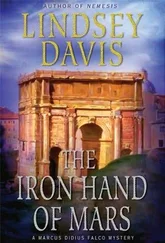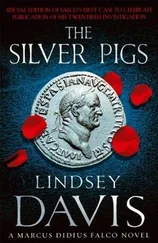Lindsey Davis - Three Hands in The Fountain
Здесь есть возможность читать онлайн «Lindsey Davis - Three Hands in The Fountain» весь текст электронной книги совершенно бесплатно (целиком полную версию без сокращений). В некоторых случаях можно слушать аудио, скачать через торрент в формате fb2 и присутствует краткое содержание. Жанр: Исторический детектив, на английском языке. Описание произведения, (предисловие) а так же отзывы посетителей доступны на портале библиотеки ЛибКат.
- Название:Three Hands in The Fountain
- Автор:
- Жанр:
- Год:неизвестен
- ISBN:нет данных
- Рейтинг книги:5 / 5. Голосов: 1
-
Избранное:Добавить в избранное
- Отзывы:
-
Ваша оценка:
- 100
- 1
- 2
- 3
- 4
- 5
Three Hands in The Fountain: краткое содержание, описание и аннотация
Предлагаем к чтению аннотацию, описание, краткое содержание или предисловие (зависит от того, что написал сам автор книги «Three Hands in The Fountain»). Если вы не нашли необходимую информацию о книге — напишите в комментариях, мы постараемся отыскать её.
Three Hands in The Fountain — читать онлайн бесплатно полную книгу (весь текст) целиком
Ниже представлен текст книги, разбитый по страницам. Система сохранения места последней прочитанной страницы, позволяет с удобством читать онлайн бесплатно книгу «Three Hands in The Fountain», без необходимости каждый раз заново искать на чём Вы остановились. Поставьте закладку, и сможете в любой момент перейти на страницу, на которой закончили чтение.
Интервал:
Закладка:
Buying a patch of six-foot-high wild nettles in the faint hope of becoming an equestrian sounded about my level of ambition. Only an idiot would do it. Nobody lived down here on the flat. It was unhealthy and dingy. Anyone with taste and money acquired a minor Palace on a plot surrounded by topiary among the picturesque crags over which the river Anio tumbled in a dramatic cascade.
The Anio was the pretty waterway into which, according to Bolanus, some local madman habitually threw dissected human body parts.
XLVIII
I had not come to enjoy the scenery.
The first task was to familiarise myself rapidly with the area. We were perched at the southern end of the Sabine Hills. We had come out on the ancient Via Tiburtina, crossing the Anio twice, first outside Rome on the Pons Mammaeus, and then later on the five-arched Pons Lucanus, dominated by the handsome tomb of the Plautii. We were already in rich man's territory, signalled by the thermal springs at Aquae Albulae, into which Sedina had made sure she dunked Petronius. Since the hot baths were supposed to cure throat and urinary infections, I could not see that they had much relevance for a man who had been punched and kicked halfway to oblivion, and the unsavoury sight of his wounds certainly caused a flurry of fast-exiting invalids. The feeder lakes were pretty: an astonishing vivid blue. The smell of sulphur pervading the neighbourhood was thoroughly off-putting.
Lest we turn into tourists, the Emperor had done his best to spoil the succeeding area. It was being used to quarry the travertine stone for the huge new Flavian Amphitheatre in Rome, the process scarring the landscape and filling up the roads with carts. It must be distressing the snobs who had made their holiday homes here, but they could hardly protest about Vespasian's pet scheme.
All the way across the Campagna we had been accompanied by the high, handsome arches of the major aqueducts. Even when they veered away from the road, we could still see the great tawny arcades, dominating the plain as they strode towards Rome from the hills. They took a wide sweep, travelling miles in the process, in order to provide as gentle a gradient as possible and arrive at the city still high enough to supply its citadels, the Palatine and the Capitol.
At the point where the plain ran out and the hills started, encircled by fine olive groves and commanding unparalleled vistas, stood Tibur. There the incoming River Anio was forced to turn round three corners through a narrow gorge, producing fabulous cascades. The high ground ended abruptly in an escarpment, and the river simply fell straight over the edge, tumbling two hundred yards in its descent.
Sacred to the Sibyl Albunia, this breathtaking spot had been provided not just with the Sibyl's elegant crag-top temple but those of Hercules Victor and Vesta as well, popular subjects for artists throughout Italy when painting landscapes in roundels to adorn the walls of fashionable dining-rooms. Here statesmen created opulent country houses, inspiring yet more derivative art. Poets haunted the place like intellectual vagrants. Maecenas, the financier of Caesar and power-broker of Augustus, had his sumptuous nook here. Augustus himself came. Varus, the legendary military incompetent who lost three whole legions in Germany, owned a spread and had a road named after him. Everywhere was dripping with wealth and appropriately snobbish. The town centre was neat, clean, and prettied up with well-positioned maidenhair ferns. The populace seemed friendly. They usually do in towns where the main occupation is overcharging visitors.
We knew Bolanus was up in the hills, so a messenger was sent to announce our arrival. Meanwhile, Julius Frontinus and I shared out the job of checking the real estate. He took the sinister mansions with private racing stadia and armed guards, the ones which were supposed to be impenetrable to strangers. Most opened the gate for a consular official with six lictors. (Of course he had brought the lictors. They deserved a holiday. He was thoroughly considerate.) I took the rest of the properties, which were fewer than I had feared. Tibur was a millionaires' playground. So exclusive it was worse than the Bay of Neapolis in high summer.
Helena Justina had decided she would co-ordinate our efforts. Sedina helped look after Julia, in the periods when she had put Petronius down for a nap. That left Helena free to organise Frontinus and me, a task she set about with glee.
She drew up a map of the whole district, plotting who lived where, and whether they should go on our list of suspects. For various reasons, the list ended up shorter than it might have been.
'Since the aqueduct killer has apparently been at his grisly trade for a long time, we can omit anyone with recently acquired property,' Helena reminded us. 'Since he kills so repeatedly, we can probably ignore all the large villas which are occupied only on a very irregular basis. Their owners don't come here often enough. We are looking for something extremely specific: a family who use Tibur not just as a relaxing resort where they may – or may not – be staying at given times of year, and from which they may – or just as easily may not – return to Rome for major festivals. Your search is for people who routinely visit all the Games, and who have done so assiduously for decades. If they own a house with access to the river, so much the better.'
Obtaining this information was normally not difficult. If Frontinus found any property-owners at home he asked them outright about their habits and movements. People responded well. Assisting an official tribunal is a public duty – with penalties for default. My approach was more subtle, but worked equally well; I invited folk to gossip about their neighbours. I found plenty of material.
'You both learned a lot,' Helena said, sitting us down for a conference after a day's hard work. Frontinus had been brought down to the farm; he was not at all shy of visiting a set of huts in a nettle Patch. Helena grumbled at him just as much as at me: 'The trouble is, your work has not thrown up many likely suspects.'
'Are we going wrong?' Frontinus asked meekly.
'Don't let her bully you,' I grinned.
She looked upset. 'Am I being bossy, Marcus?'
'You are being yourself, dear heart.'
'I don't want to behave immodestly.'
'Cobnuts, Helena! You can see the Consul and I are listening like woolly lambs. Tell us the score.'
'Well look, this is a typical example: Julius Frontinus interviewed a family called the Luculli. They have a large house near the cascade, with a sublime aspect towards the Temple of the Sibyl -'
'They are staying here at the moment, and readily admit that they all went to Rome together for several days of the last Games,' Frontinus reported, still looking slightly nervous of Helena's enthusiasm.
'Yes, but, sir -' That 'sir' was a sop to his vanity; he took it well. 'The Luculli are a family who have been loaded with money for three or four generations. As a result, they have bought themselves villas in all the fashionable resorts. They have two on the Bay of Neapolis – facing each other from Cumae and Surrentum – plus their yachting base on the Alban Lake, their northern estate at Clusium, their southern one at Velia, and in this area they not only own the house in Tibur where we found them, but another at Tusculum and yet a third at Praeneste – which it turns out is really their old-fashioned favourite when seeking cooler air to escape to from the heat of summer in Rome.'
Frontinus looked thoroughly quashed.
Lindsey Davis
Three Hands in The Fountain
I rubbed it in cheerfully. 'So the chances of the lucky Luculli following a regular pattern are zero.'
'Quite,' said Helena. They are always on the move. Even if they regularly visit Rome for festivals, half the time they aren't staying here. The person you want kidnaps his victims, then apparently always disposes of them in exactly the same way, and presumably in the same place.'
Читать дальшеИнтервал:
Закладка:
Похожие книги на «Three Hands in The Fountain»
Представляем Вашему вниманию похожие книги на «Three Hands in The Fountain» списком для выбора. Мы отобрали схожую по названию и смыслу литературу в надежде предоставить читателям больше вариантов отыскать новые, интересные, ещё непрочитанные произведения.
Обсуждение, отзывы о книге «Three Hands in The Fountain» и просто собственные мнения читателей. Оставьте ваши комментарии, напишите, что Вы думаете о произведении, его смысле или главных героях. Укажите что конкретно понравилось, а что нет, и почему Вы так считаете.












